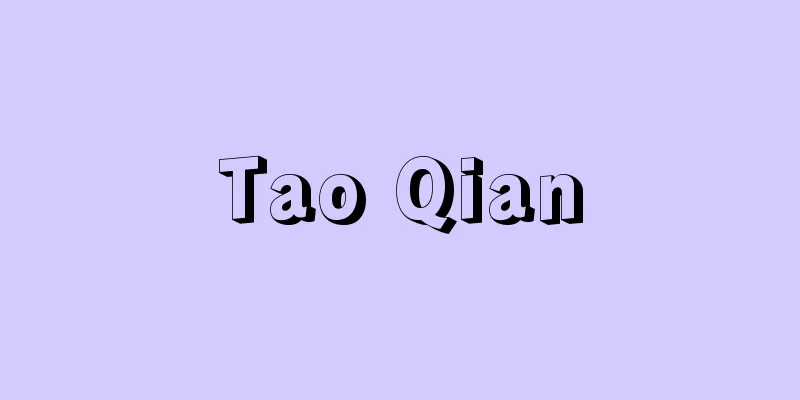Tao Qian

|
A poet from the Eastern Jin and Song dynasties of China. His pen name was Yuanming. His real name was Yuanming, and his pen name was Yuanliang. He was from Xunyang Chaisang (Jiangxi Province). [Tadahisa Ishikawa] 13 years of serviceHe is said to be the great-grandson of Tao Kan, a great military figure who made great contributions in the early days of the Eastern Jin Dynasty, but the achievements of neither his grandfather nor his father are clear. His maternal grandfather, Meng Jia, served General Huan Wen and was known as a refined man. He was born into a poor family of lower-ranking nobles, and his father died early. He studied hard in his youth and had hopes of making a name for himself, but at the age of 29 he became a provincial saishū (in charge of academic affairs) and entered the government for the first time. He soon left that position and then became a chief clerk (in charge of secretarial work), but he did not take up the position and returned to his hometown for a time. At the age of 35, he became a staff officer for the General of the Confederacy and participated in the suppression of rebellions, and also served in the government of Huan Xuan, a military figure in Jingzhou (Hubei Province). Finally, he resigned as the governor of Pengze, near his hometown, after serving for over 80 days, putting an end to his 13-year career as a government official. He was 41 years old. His famous line when he resigned from his governorship was, "How could I bow down to a small-time official from my hometown for five dou of rice (a governor's salary)?", showing how he could not bow down to a small-time official from the county (there is a county below the county) who came to inspect the county. [Tadahisa Ishikawa] Return to the countrysideIn the aristocratic society of the time, those who came from lowly families could not achieve success, and although Enmei was proud of his ancestors and their talents, his dream of success was not realized in the end. "Kikyorainoji" describes his feelings about returning to the countryside. The first half of the poem depicts the sense of liberation he felt after leaving his service at the palace and returning to the countryside, set against the backdrop of autumn scenery, while the second half depicts his feelings of entrusting the rest of his life to the will of heaven, set against the backdrop of spring scenery, as old age approaches. The poem begins with the famous line, "I wonder if I should return? The countryside is so dreary, why should I not return?" and has a strong lamentative tone throughout, but it is a masterpiece rich in fresh descriptions of the scenery and pure charm. This can be seen as a declaration that he is finally retiring from his official career and entering a life of seclusion. From then on, he lived as a recluse, mainly in the vicinity of the provincial capital of Xunyang (Jiujiang City), and gained fame until his death at the age of 63. When he was in his 50s, he was awarded the title of Sakusakusarou, a title given nominally to recluses, by the imperial court. [Tadahisa Ishikawa] The Reclusive PoetToday, nine four-line poems and over 120 five-line poems by Yuanming have been passed down. The contents of his poems include those about the life of a hermit in the countryside, those expressing his comfortable state of mind, poems exchanged with prefecture and county officials, historical writings, and pseudo-classical writings. Even in the midst of his elegant and tranquil style, he sometimes expresses intense emotions, and Su Dongpo (Su Shi) of the Song Dynasty commented, "His poems are simple but beautiful, and thin but rich." He also had a natural penchant for alcohol, and his poems are said to be "full of wine." Among them, the series of 20 poems entitled "Drinking" that he wrote while drinking sake on a lonely autumn night conveys Enmei's unique poetic realm to the fullest. Let's look at "Sono Go", the most well-known of them all. Having tied up his hut, he is in the human world, Yet there is no noise from carriages and horses I ask the lord, "How can you be so good?" When the mind is far away, the earth naturally becomes biased. Arranging chrysanthemums under the eastern fence However, this style of poetry was unique at the time, and was not in the mainstream of the poetry world, and even in the "Poetry Collection," it is only ranked as a middle-grade, upper-middle-grade work. It was far from the mainstream of Six Dynasties poetry, which was the elegant poems of contemporaries such as Xie Lingyun and Yan Yanzhi, who used rhetorical devices. Although his influence was respected by Prince Zhaoming Xiao Tong of Liang, who compiled the "Wen Xuan," it did not go beyond the realm of hobbyism and was not seen much during the Six Dynasties period. In the Tang Dynasty, he was admired by naturalistic poets such as Wang Wei, Meng Haoran, Wei Yingwu, and Liu Zongyuan, and his status was greatly improved, and he was praised by Su Dongpo of the Song Dynasty, establishing his name as not only the best poet of the Six Dynasties, but also a poet unrivaled in history. In addition to poetry, there are also fu (such as "Fu'u of Leisurely Feelings"), prose (such as "A Self-Memorial Essay" and "Commentary to Zi Gen and others") and miscellaneous biographies (such as "Biography of Master Five Willows", "Biography of Five Filial Piety" and "Forty-Eight Images"), of which "Biography of Master Five Willows" is the most famous. It is a tale of a hermit, so named because there were five willow trees planted around his house, but it has also been criticized as a depiction of Yuanming himself. Also well known is "Records of the Peach Blossom Spring", a tale of a mysterious village deep in a forest of blooming peach blossoms, which is included in "Search for the Gods Later", compiled by Yuanming. There are many stories about his life of seclusion, such as the story of Yan Yanzhi giving him 20,000 sen for alcohol, the story of him sitting among chrysanthemum flowers without alcohol and Wang Hong, the governor of Jiangzhou, bringing him some, the story of him straining alcohol with his hood, the story of him caressing an unstringed koto, and the story of his three laughs with Huxi, Huiyuan, and Lu Xiujing. All of these stories exaggerate and embellish his life of seclusion. After his death, he was posthumously given the title Jingzhi, and Yan Yanzhi wrote a eulogy for him. Ten volumes of the "Tao Jingzhishu" are known. It was introduced to Japan at an early date, and in Fujiwara Sukeyo's "Catalogue of Books Seen in Japan" (the oldest catalogue of Chinese books introduced to Japan), there is an entry for "The Ten Volumes of the Tao Qian Collection." This shows that it has been a beloved read since the imperial court era. It is well known that "Drinking, Part 5" is quoted in Natsume Soseki's "Kusakura," and that Ishikawa Takuboku's diary (December 27, 1907) contains his impressions of reading the collection of poems. [Tadahisa Ishikawa] “Tomoyoshi Kazumi, Anthology of Chinese Poets 4, Mei Toubuchi” (1958, Iwanami Shoten)” ▽ “Tomoyoshi Kazumi, Kozen Kogyo, annotation and translation, “Complete Works of World Classical Literature 25: Mei Toubuchi, Bunshin Kaoryu” (1983, Chikuma Shobo)” ▽ ``Toen Meiden'' by Kojiro Yoshikawa (1956, Shinchosha) ▽ ``Chinese Poet 2: Touen Meiden'' by Shigeo Matsueda et al. (1983, Shueisha) [References] | |Source: Shogakukan Encyclopedia Nipponica About Encyclopedia Nipponica Information | Legend |
|
中国、東晋(とうしん)・宋(そう)の詩人。字(あざな)は淵明(えんめい)。また、本名淵明、字を元亮(げんりょう)ともいう。潯陽柴桑(じんようさいそう)(江西省)の人。 [石川忠久] 13年間の宮仕え東晋王朝の草創期に大功をたてた軍閥の大立物陶侃(とうかん)の曽孫(そうそん)というが、祖父、父とも事績ははっきりしない。母方の祖父孟嘉(もうか)は、将軍桓温(かんおん)に仕え、風流な人物として知られる。下級貴族の貧乏な家に生まれ、父は早く亡くなった。若いころ勉学に励み、立身の望みを抱くが、29歳で初めて州の祭酒(さいしゅ)(学事担当)となって仕官した。それもまもなくやめ、続いて主簿(しゅぼ)(秘書担当)となったが就任せず、一時故郷に帰った。35歳のころ、鎮軍将軍の参軍(幕僚)となって一揆(いっき)討伐に従軍、また荊州(けいしゅう)(湖北省)の軍閥桓玄(かんげん)の幕府にも仕えた。最後に故郷にほど近い彭沢(ほうたく)の令(県の長)を80日余勤めて辞め、足掛け13年にわたる役人生活に終止符を打った。41歳であった。「われ豈五斗米(あにごとべい)(県令の俸給)のために腰を折りて郷里の小人に向かわんや」とは、県を査察にきた郡の小役人(郡の下に県がある)にぺこぺこできるものか、と県令の職をなげうったときの名せりふである。 [石川忠久] 田園に帰る当時の貴族社会においては、低い家柄の出身は結局うだつがあがらず、祖先の誇りと才能を自負する淵明ではあったが、ついに立身の夢は果たされなかったのである。その田園へ帰る心境を述べたものが「帰去来兮辞(ききょらいのじ)」である。前半は、宮仕えを辞めて田園へ帰った解放感を秋の情景のなかに描き、後半は、迫りくる老年に、もっぱら残りの人生を天命に任せる心境を春の情景のなかに描く。「帰りなんいざ、田園まさに蕪(あ)れなんとす、胡(なん)ぞ帰らざる」の名句で始まり、全体に詠嘆的調子が強いが、新鮮な情景描写と清らかな風趣に富む傑作である。これは、いよいよ役人を辞めて隠逸生活に入るという宣言の意味をもつもの、とみることができよう。以後は、63歳で死ぬまで、おもに州都の潯陽(九江市)近辺にあって隠逸の士として世に処し、名声を得た。50歳過ぎのころ、朝廷より、隠士に名目的に与えられる著作佐郎の官を授けられている。 [石川忠久] 隠逸詩人の宗淵明の詩は今日、四言詩9首、五言詩120首余りが伝わっている。内容は、田園における隠士の生活を歌ったもの、自適の心境を吐露したもの、州県の役人たちとの贈答詩、詠史、擬古などが主である。閑雅な趣(おもむき)のなかにも、ときに激しい感情が表されており、宋の蘇東坡(そとうば)(蘇軾(そしょく))はこれを評して、「その詩は質(質朴)であるが実は綺(き)(あでやか)、癯(く)(やせている)であるが実は腴(ゆ)(豊か)」といっている。また彼は性来酒を好み、その詩は「篇々(へんぺん)酒有り」と称せられるほどである。なかでも、秋の夜のつれづれに酒を飲み書き散らしたという「飲酒」と題する20首の連作は、淵明独特の詩境を余すところなく伝えるものである。もっとも人口に膾炙(かいしゃ)する「其(そ)の五」をみよう。 結廬在人境 しかし、この詩風は当時にあっては特異な位置にあるもので、詩壇の主流にはなく、『詩品』でも上中下の中品に列しているにすぎない。同時代の謝霊運(しゃれいうん)や顔延之(がんえんし)らの修辞に意を用いた秀麗な詩が六朝(りくちょう)詩の本流であるのには遠く及ばないものであった。その影響も、『文選(もんぜん)』を編した梁の昭明太子蕭統(しょうとう)らの尊崇を得てはいるが、好事(こうず)の域を出ず、六朝期にはさほどみられない。唐代に入って、王維(おうい)、孟浩然(もうこうねん)、韋応物(いおうぶつ)、柳宗元(りゅうそうげん)らの自然派の詩人の仰ぐところとなり、大いに位置を高め、宋の蘇東坡の賞賛に至って、六朝第一のみならず、古今独歩の詩人の名を確立した。 詩のほかに、賦(ふ)(「閑情賦」など)、散文(「自祭文」「子儼(げん)らに与うる疏(そ)」など)、雑伝(「五柳(ごりゅう)先生伝」「五孝伝」「四十八目」など)があり、なかでも「五柳先生伝」が有名である。家の周りに5本の柳が植えてあるのでそうよばれる隠者の伝だが、淵明自身を描いたものだと評された。また、桃の花咲く林の奥の不思議な村里の物語「桃花源記(とうかげんき)」もよく知られるが、これは淵明の編という『捜神後記(そうじんこうき)』中に収められている。 彼の隠逸生活にまつわるエピソードは多く、顔延之が酒代2万銭を恵んだ話、酒がなくて菊の花の中に座っていたら、江州刺史(しし)(長官)の王弘(おうこう)が酒を届けた話、頭巾(ずきん)で酒を漉(こ)した話、弦の張っていない琴(きん)を愛撫(あいぶ)した話、慧遠(えおん)・陸修静(りくしゅうせい)との虎渓(こけい)の三笑の話など、いずれも隠逸ぶりが誇張され、尾ひれがついたものである。死後、靖節(せいせつ)と諡(おくりな)され、顔延之が誄(るい)を書いた。『陶靖節集』10巻が伝わる。 わが国へは早くから伝来し、藤原佐世(すけよ)の『日本国見在書目録』(日本へ伝来した漢籍のもっとも古い書目)に「陶潜集十巻」という記載がある。王朝時代より愛読されていたことがわかる。夏目漱石(そうせき)の『草枕(くさまくら)』に「飲酒 其の五」が引用され、石川啄木(たくぼく)の日記(明治40年12月27日)に、その詩集を読んだ感想が述べられているのはよく知られる。 [石川忠久] 『一海知義注『中国詩人選集4 陶淵明』(1958・岩波書店)』▽『一海知義・興膳宏校注・訳『世界古典文学全集25 陶淵明・文心雕龍』(1983・筑摩書房)』▽『吉川幸次郎著『陶淵明伝』(1956・新潮社)』▽『松枝茂夫他著『中国の詩人2 陶淵明』(1983・集英社)』 [参照項目] | |出典 小学館 日本大百科全書(ニッポニカ)日本大百科全書(ニッポニカ)について 情報 | 凡例 |
Recommend
Nostoc algae (Nostoc algae)
A genus of filamentous cyanobacteria, it has heter...
Esposito, G.
...The north face is particularly famous in the h...
Waste rock - Haiseki
This refers to unused rocks discarded during the ...
Johannes Jonstons
1603‐75 A Polish physician and naturalist, his Eng...
Toshiko Akiyoshi
Jazz pianist, composer, and band leader. Her real...
dagger plant
...Most species are shrubs, but some species do n...
Unzen azalea - Unzen azalea
An evergreen shrub of the Ericaceae family (APG c...
Checkered beetles
A general term for insects belonging to the famil...
Pereira, Aristides Maria
Born 1924. Boa Vista, Cape Verde. A liberation mov...
Canis lupus pallipes (English spelling)
…[Tokuji Chiba]. … *Some of the terminology that ...
English Dictionary
...It attracted attention as a general English di...
Hideyori Kano
Year of birth: Year of birth and death unknown. A ...
Shin Hiyoshi - Imahie
...It began in 1160 (Eiraku 1) when Emperor Goshi...
Hirshvogel, A.
…This refers to prints made using copperplates as...
Tadaka Ichijo
1812-1863 A court noble in the late Edo period. B...
![Bougainville [island] - Bougainville](/upload/images/67ccb19081734.webp)








